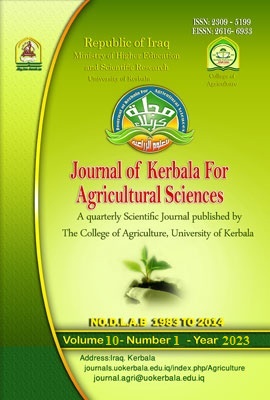Abstract
Enzymes are naturally produced by living cells to cause specific biochemical reac-tions to catalyze the catabolic reactions by which substrates are digested into sub-strates’ chemical compounds. These simple compounds are used in turn for cell growth. α-amylase and lipase are considered important enzymes for this process. The present study was carried out to investigate the effect of feeding Awassi lambs two levels of dietary protein and addition of probiotic (live Saccharomyces cerevisiae more than 3.0 × 1013 CFU/g and Bacillus subtilis more than 4.0 × 109 CFU/g) on α-amylase and lipase serum concentrations. Sixteen Awassi lambs were used in this study. Animals grouped into four treatments (four animals per each group). Lambs in the first treatment were fed concentrate diet containing 12% crude protein (CP) with-out probiotics. In the second treatment lambs were fed concentrate diet containing 12% CP plus 1 kg/ton of probiotic. In the third treatment lambs were fed concentrate diet containing 14% CP without probiotic. In the four treatment lambs were fed con-centrate diet containing 14% CP plus 1 kg/ton of probiotic. Results showed that there is a significant decrease (P<0.01) in the α-amylase concentration due to increasing CP level in concentrate diet from 12 to 14%. Regarding the interaction treatments, higher (P<0.05) α-amylase concentration was detected in serum of lambs fed lower level of CP (12%) with or without probiotic as compared with those fed higher level of CP (14%) with or without probiotic. However no significant difference was ob-served between lambs fed 12 and 14% CP with probiotic. Regarding lipase, no signif-icant differences were shown whether among the main effects or interaction treat-ments. We could conclude that, in the effect of main factors, α-amylase concentration was increased by lower dietary protein CP level (12%) was fed . In the interaction treatments, α-amylase concentration was increased when lower dietary protein CP (12%) with or without probiotic. Concerning lipase, serum concentrations were not significantly affected by level of dietary CP or interaction with addition of probiotic
